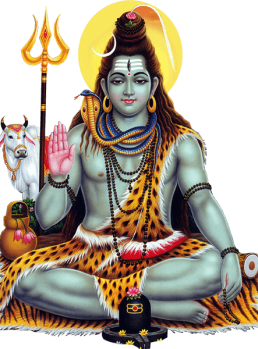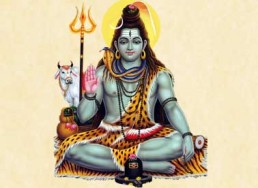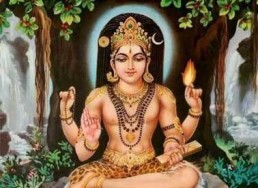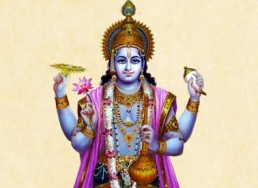Rudram Laghunyasam
Sri Rudram – Laghunyasam Introduction
The word Laghunyasam, meaning ‘brief invocation’ is a combination of two Sanskrit terms: Laghu (लघु) – meaning “short,” “concise,” or “brief.” Nyasam (न्यास) – meaning “placement” or “dedication,” often referring to the mental assignment of different parts of the body to different deities in ritualistic worship.
Laghunyasam is a preparatory Vedic chant recited before Sri Rudram to invoke inner purification and align the devotee’s body, mind, and soul with divine energies. It focuses on the identification of different parts of the body with various deities and cosmic elements, sanctifying the individual as a vessel of divine power. The chant calls upon the five elements (earth, water, fire, air, and space), Rudra’s divine forms, and Shiva’s presence in all directions, purifying the devotee on multiple levels. The Laghunyasam is meant to prepare the chanter for the more intense worship that follows in Sri Rudram, invoking both physical and spiritual readiness to fully absorb Shiva’s grace and blessings.
More information on the Laghunyasam can be found at the end of this page.
Sri Rudram Links on our site
Sri Rudram – Namakam – Chanting
Sri Rudram – Namakam – Translation & Meaning
Sri Rudram – Chamakam – Chanting
Sri Rudram – Chamakam – Translation & Meaning
Sri Rudram – Laghunyasam – Chanting
Sri Rudram – Laghunyasam – Translation & Meaning
ॐ अथात्मानꣳ शिवात्मानग् श्रीरुद्ररूपं ध्यायेत् ॥
oṃ athātmānagͫ śivātmānag śrīrudrarūpaṃ dhyāyet ..
सर्वाभरणभूषितम् ॥ नीलग्रीवं शशाङ्काङ्कं नागयज्ञोपवीतिनम् ।
व्याघ्रचर्मोत्तरीयं च वरेण्यमभयप्रदम् ॥ कमण्डल्वक्षसूत्राणां
धारिणं शूलपाणिनम् । ज्वलन्तं पिङ्गलजटाशिखामुद्योतधारिणम् ॥
sarvābharaṇabhūṣitam .. nīlagrīvaṃ śaśāṅkāṅkaṃ nāgayajñopavītinam .
vyāghracarmottarīyaṃ ca vareṇyamabhayapradam .. kamaṇḍalvakṣasūtrāṇāṃ
dhāriṇaṃ śūlapāṇinam . jvalantaṃ piṅgalajaṭāśikhāmudyotadhāriṇam ..
दिव्यभोगसमन्वितम् ॥ दिग्देवतासमायुक्तं सुरासुरनमस्कृतम् । नित्यं
च शाश्वतं शुद्धं ध्रुवमक्षरमव्ययम् ॥ सर्वव्यापिनमीशानं रुद्रं
वै विश्वरूपिणम् । एवं ध्यात्वा द्विजसम्यक् ततो यजनमारभेत् ॥
divyabhogasamanvitam .. digdevatāsamāyuktaṃ surāsuranamaskṛtam . nityaṃ
ca śāśvataṃ śuddhaṃ dhruvamakṣaramavyayam .. sarvavyāpinamīśānaṃ rudraṃ
vai viśvarūpiṇam . evaṃ dhyātvā dvijasamyak tato yajanamārabhet ..
हस्तयोर्हरस्तिष्ठतु । बाह्वोरिन्द्रस्तिष्ठतु । जठरेऽग्निस्तिष्ठतु ।
हृदये शिवस्तिष्ठतु । कण्ठे वसवस्तिष्ठन्तु । वक्त्रे सरस्वती
तिष्ठतु । नासिकयोर्वायुस्तिष्ठतु । नयनयोश्चन्द्रादित्यौ
तिष्ठेताम् । कर्णयोरश्विनौ तिष्ठेताम् । ललाटे रुद्रास्तिष्ठन्तु ।
मूर्ध्न्यादित्यास्तिष्ठन्तु । शिरसि महादेवस्तिष्ठतु । शिखायां
वामदेवस्तिष्ठतु । पृष्ठे पिनाकी तिष्ठतु । पुरतः शूली तिष्ठतु ।
पार्श्वयोः शिवाशङ्करौ तिष्ठेताम् । सर्वतो वायुस्तिष्ठतु । ततो बहिः
सर्वतोऽग्निर्ज्वालामाला परिवृतस्तिष्ठतु । सर्वेष्वङ्गेषु सर्वा देवता
यथास्थानं तिष्ठन्तु । माꣳ रक्षन्तु । सर्वान् महाजनान् रक्षन्तु ॥
hastayorharastiṣṭhatu . bāhvorindrastiṣṭhatu . jaṭhare’gnistiṣṭhatu .
hṛdaye śivastiṣṭhatu . kaṇṭhe vasavastiṣṭhantu . vaktre sarasvatī
tiṣṭhatu . nāsikayorvāyustiṣṭhatu . nayanayoścandrādityau
tiṣṭhetām . karṇayoraśvinau tiṣṭhetām . lalāṭe rudrāstiṣṭhantu .
mūrdhnyādityāstiṣṭhantu . śirasi mahādevastiṣṭhatu . śikhāyāṃ
vāmadevastiṣṭhatu . pṛṣṭhe pinākī tiṣṭhatu . purataḥ śūlī tiṣṭhatu .
pārśvayoḥ śivāśaṅkarau tiṣṭhetām . sarvato vāyustiṣṭhatu . tato bahiḥ
sarvato’gnirjvālāmālā parivṛtastiṣṭhatu . sarveṣvaṅgeṣu sarvā devatā
yathāsthānaṃ tiṣṭhantu . māgͫ rakṣantu . sarvān mahājanān rakṣantu ..
अहममृते । अमृतं ब्रह्मणि । वायुर्मे प्राणे श्रितः ।
प्राणो हृदये । हृदयं मयि । अहममृते । अमृतं
ब्रह्मणि । सूर्यो मे चक्षुषि श्रितः । चक्षुर्हृदये ।
हृदयं मयि । अहममृते । अमृतं ब्रह्मणि ।
चन्द्रमा मे मनसि श्रितः । मनो हृदये । हृदयं
मयि । अहममृते । अमृतं ब्रह्मणि । दिशो मे
श्रोत्रे श्रिताः । श्रोत्रꣳ हृदये । हृदयं मयि ।
अहममृते । अमृतं ब्रह्मणि । आपो मे रेतसि श्रिताः ।
रेतो हृदये । हृदयं मयि । अहममृते । अमृतं
ब्रह्मणि । पृथिवी मे शरीरे श्रिता । शरीरग्ं हृदये ।
हृदयं मयि । अहममृते । अमृतं ब्रह्मणि ।
ओषधिवनस्पतयो मे लोमसु श्रिताः । लोमानि
हृदये । हृदयं मयि । अहममृते । अमृतं
ब्रह्मणि । इन्द्रो मे बले श्रितः । बलꣳ हृदये ।
हृदयं मयि । अहममृते । अमृतं ब्रह्मणि ।
पर्जन्यो मे मूर्ध्नि श्रितः । मूर्धा हृदये । हृदयं
मयि । अहममृते । अमृतं ब्रह्मणि । ईशानो मे मन्यौ
श्रितः । मन्युर्हृदये । हृदयं मयि । अहममृते ।
अमृतं ब्रह्मणि । आत्मा म आत्मनि श्रितः । आत्मा
हृदये । हृदयं मयि । अहममृते । अमृतं
ब्रह्मणि । पुनर्म आत्मा पुनरायुरागात् । पुनः प्राणः
पुनराकूतमागात् । वैश्वानरो रश्मिभिर्वावृधानः ।
अन्तस्तिष्ठत्वमृतस्य गोपाः ॥
ahamamṛte . amṛtaṃ brahmaṇi . vāyurme prāṇe śritaḥ .
prāṇo hṛdaye . hṛdayaṃ mayi . ahamamṛte . amṛtaṃ
brahmaṇi . sūryo me cakṣuṣi śritaḥ . cakṣurhṛdaye .
hṛdayaṃ mayi . ahamamṛte . amṛtaṃ brahmaṇi .
candramā me manasi śritaḥ . mano hṛdaye . hṛdayaṃ
mayi . ahamamṛte . amṛtaṃ brahmaṇi . diśo me
śrotre śritāḥ . śrotragͫ hṛdaye . hṛdayaṃ mayi .
ahamamṛte . amṛtaṃ brahmaṇi . āpo me retasi śritāḥ .
reto hṛdaye . hṛdayaṃ mayi . ahamamṛte . amṛtaṃ
brahmaṇi . pṛthivī me śarīre śritā . śarīragṃ hṛdaye .
hṛdayaṃ mayi . ahamamṛte . amṛtaṃ brahmaṇi .
oṣadhivanaspatayo me lomasu śritāḥ . lomāni
hṛdaye . hṛdayaṃ mayi . ahamamṛte . amṛtaṃ
brahmaṇi . indro me bale śritaḥ . balagͫ hṛdaye .
hṛdayaṃ mayi . ahamamṛte . amṛtaṃ brahmaṇi .
parjanyo me mūrdhni śritaḥ . mūrdhā hṛdaye . hṛdayaṃ
mayi . ahamamṛte . amṛtaṃ brahmaṇi . īśāno me manyau
śritaḥ . manyurhṛdaye . hṛdayaṃ mayi . ahamamṛte .
amṛtaṃ brahmaṇi . ātmā ma ātmani śritaḥ . ātmā
hṛdaye . hṛdayaṃ mayi . ahamamṛte . amṛtaṃ
brahmaṇi . punarma ātmā punarāyurāgāt . punaḥ prāṇaḥ
punarākūtamāgāt . vaiśvānaro raśmibhirvāvṛdhānaḥ .
antastiṣṭhatvamṛtasya gopāḥ ..
सङ्कर्षणमूर्तिस्वरूपो योऽसावादित्यः परमपुरुषः स एष रुद्रो देवता ।
नमः शिवायेति बीजम् । शिवतरायेति शक्तिः । महादेवायेति कीलकम् ।
श्री साम्बसदाशिव प्रसाद सिद्ध्यर्थे जपे विनियोगः ॥
saṅkarṣaṇamūrtisvarūpo yo’sāvādityaḥ paramapuruṣaḥ sa eṣa rudro devatā .
namaḥ śivāyeti bījam . śivatarāyeti śaktiḥ . mahādevāyeti kīlakam .
śrī sāmbasadāśiva prasāda siddhyarthe jape viniyogaḥ ..
दर्शपूर्णमासात्मने तर्जनीभ्यां नमः ।
चातुर्मास्यात्मने मध्यमाभ्यां नमः ।
निरूढपशुबन्धात्मने अनामिकाभ्यां नमः ।
ज्योतिष्टोमात्मने कनिष्ठिकाभ्यां नमः ।
सर्वक्रत्वात्मने करतलकरपृष्ठाभ्यां नमः ॥
darśapūrṇamāsātmane tarjanībhyāṃ namaḥ .
cāturmāsyātmane madhyamābhyāṃ namaḥ .
nirūḍhapaśubandhātmane anāmikābhyāṃ namaḥ .
jyotiṣṭomātmane kaniṣṭhikābhyāṃ namaḥ .
sarvakratvātmane karatalakarapṛṣṭhābhyāṃ namaḥ ..
दर्शपूर्णमासात्मने शिरसे स्वाहा ।
चातुर्मास्यात्मने शिखायै वषट् ।
निरूढपशुबन्धात्मने कवचाय हुम् ।
ज्योतिष्टोमात्मने नेत्रत्रयाय वौषट् ।
सर्वक्रत्वात्मने अस्त्राय फट् ।
भूर्भुवस्सुवरोमिति दिग्बन्धः ॥
darśapūrṇamāsātmane śirase svāhā .
cāturmāsyātmane śikhāyai vaṣaṭ .
nirūḍhapaśubandhātmane kavacāya hum .
jyotiṣṭomātmane netratrayāya vauṣaṭ .
sarvakratvātmane astrāya phaṭ .
bhūrbhuvassuvaromiti digbandhaḥ ..
आपाताळनभः स्थलान्तभुवनब्रह्माण्डमाविस्फुर
ज्ज्योतिः स्फाटिकलिङ्गमौळिविलसत्पूर्णेन्दुवान्तामृतैः ।
अस्तोकाप्लुतमेकमीशमनिशं रुद्रानुवाकाञ्जपन्
ध्यायेदीप्सितसिद्धये ध्रुवपदं विप्रोऽभिषिञ्चेच्छिवम् ॥
āpātāl̤anabhaḥ sthalāntabhuvanabrahmāṇḍamāvisphura
jjyotiḥ sphāṭikaliṅgamaul̤ivilasatpūrṇenduvāntāmṛtaiḥ .
astokāplutamekamīśamaniśaṃ rudrānuvākāñjapan
dhyāyedīpsitasiddhaye dhruvapadaṃ vipro’bhiṣiñcecchivam ..
कण्ठे कालाः कपर्दाकलित शशिकलाश्चण्डकोदण्ड हस्ताः ॥
kaṇṭhe kālāḥ kapardākalita śaśikalāścaṇḍakodaṇḍa hastāḥ ..
रुद्राः श्रीरुद्रसूक्तप्रकटितविभवा नः प्रयच्छन्तु सौख्यम् ॥
rudrāḥ śrīrudrasūktaprakaṭitavibhavā naḥ prayacchantu saukhyam ..
ॐ गणानां त्वा गणपतिꣳ हवामहे
कविं कवीनामुपमश्रवस्तमम् ।
ज्येष्ठराजं ब्रह्मणां ब्रह्मणस्पत
आ नः शृण्वन्नूतिभिस्सीद सादनम् ॥
oṃ gaṇānāṃ tvā gaṇapatigͫ havāmahe
kaviṃ kavīnāmupamaśravastamam .
jyeṣṭharājaṃ brahmaṇāṃ brahmaṇaspata
ā naḥ śṛṇvannūtibhissīda sādanam ..
कामश्च मे सौमनसश्च मे भद्रं च मे श्रेयश्च मे
वस्यश्च मे यशश्च मे भगश्च मे द्रविणं च मे
यन्ता च मे धर्ता च मे क्षेमश्च मे धृतिश्च मे
विश्वं च मे महश्च मे संविच्च मे ज्ञात्रं च मे
सूश्च मे प्रसूश्च मे सीरं च मे लयश्च म ऋतं च
मेऽमृतं च मेऽयक्ष्मं च मेऽनामयच्च मे जीवातुश्च मे
दीर्घायुत्वं च मेऽनमित्रं च मेऽभयं च मे सुगं च
मे शयनं च मे सूषा च मे सुदिनं च मे ॥
kāmaśca me saumanasaśca me bhadraṃ ca me śreyaśca me
vasyaśca me yaśaśca me bhagaśca me draviṇaṃ ca me
yantā ca me dhartā ca me kṣemaśca me dhṛtiśca me
viśvaṃ ca me mahaśca me saṃvicca me jñātraṃ ca me
sūśca me prasūśca me sīraṃ ca me layaśca ma ṛtaṃ ca
me’mṛtaṃ ca me’yakṣmaṃ ca me’nāmayacca me jīvātuśca me
dīrghāyutvaṃ ca me’namitraṃ ca me’bhayaṃ ca me sugaṃ ca
me śayanaṃ ca me sūṣā ca me sudinaṃ ca me ..
निधनपतये नमः । निधनपतान्तिकाय नमः । ऊर्ध्वाय
नमः । ऊर्ध्वलिङ्गाय नमः । हिरण्याय नमः । हिरण्यलिङ्गाय
नमः । सुवर्णाय नमः । सुर्वर्णलिङ्गाय नमः । दिव्याय नमः ।
दिव्यलिङ्गाय नमः । भवाय नमः । भवलिङ्गाय नमः । शर्वाय
नमः । शर्वलिङ्गाय नमः । शिवाय नमः । शिवलिङ्गाय नमः ।
ज्वलाय नमः । ज्वललिङ्गाय नमः । आत्माय नमः । आत्मलिङ्गाय
नमः । परमाय नमः । परमलिङ्गाय नमः । एतथ्सोमस्य सूर्यस्य
सर्वलिङ्गग्ग् स्थापयति पाणिमन्त्रं पवित्रम् ॥
nidhanapataye namaḥ . nidhanapatāntikāya namaḥ . ūrdhvāya
namaḥ . ūrdhvaliṅgāya namaḥ . hiraṇyāya namaḥ . hiraṇyaliṅgāya
namaḥ . suvarṇāya namaḥ . survarṇaliṅgāya namaḥ . divyāya namaḥ .
divyaliṅgāya namaḥ . bhavāya namaḥ . bhavaliṅgāya namaḥ . śarvāya
namaḥ . śarvaliṅgāya namaḥ . śivāya namaḥ . śivaliṅgāya namaḥ .
jvalāya namaḥ . jvalaliṅgāya namaḥ . ātmāya namaḥ . ātmaliṅgāya
namaḥ . paramāya namaḥ . paramaliṅgāya namaḥ . etathsomasya sūryasya
sarvaliṅgagg sthāpayati pāṇimantraṃ pavitram ..
भवे भवे नातिभवे भवस्व माम् । भवोद्भवाय
नमः ॥ वामदेवाय नमो ज्येष्ठाय नमश्श्रेष्ठाय
नमो रुद्राय नमः कालाय नमः कलविकरणाय नमो
बलविकरणाय नमो बलाय नमो बलप्रमथनाय
नमस्सर्वभूतदमनाय नमो मनोन्मनाय नमः ॥
bhave bhave nātibhave bhavasva mām . bhavodbhavāya
namaḥ .. vāmadevāya namo jyeṣṭhāya namaśśreṣṭhāya
namo rudrāya namaḥ kālāya namaḥ kalavikaraṇāya namo
balavikaraṇāya namo balāya namo balapramathanāya
namassarvabhūtadamanāya namo manonmanāya namaḥ ..
सर्वशर्वेभ्यो नमस्ते अस्तु रुद्ररूपेभ्यः ॥ तत्पुरुषाय
विद्महे महादेवाय धीमहि । तन्नो रुद्रः प्रचोदयात् ॥
sarvaśarvebhyo namaste astu rudrarūpebhyaḥ .. tatpuruṣāya
vidmahe mahādevāya dhīmahi . tanno rudraḥ pracodayāt ..
ब्रह्माऽधिपतिर्ब्रह्मणोऽधिपतिर्ब्रह्मा शिवो मे अस्तु
सदाशिवोम् ॥
brahmā’dhipatirbrahmaṇo’dhipatirbrahmā śivo me astu
sadāśivom ..
उमापतये पशुपतये नमो नमः । ऋतꣳ सत्यं परं ब्रह्म
पुरुषं कृष्णपिङ्गलम् । ऊर्ध्वरेतं विरूपाक्षं
विश्वरूपाय वै नमो नमः ॥ सर्वो वै रुद्रस्तस्मै
रुद्राय नमो अस्तु । पुरुषो वै रुद्रस्सन्महो नमो नमः ।
विश्वं भूतं भुवनं चित्रं बहुधा जातं जायमानं
च यत् । सर्वो ह्येष रुद्रस्तस्मै रुद्राय नमो अस्तु ।
कद्रुद्राय प्रचेतसे मीढुष्टमाय तव्यसे । वो चेम
शन्तमꣳ हृदे । सर्वो ह्येष रुद्रस्तस्मै रुद्राय
नमो अस्तु ॥
umāpataye paśupataye namo namaḥ . ṛtagͫ satyaṃ paraṃ brahma
puruṣaṃ kṛṣṇapiṅgalam . ūrdhvaretaṃ virūpākṣaṃ
viśvarūpāya vai namo namaḥ .. sarvo vai rudrastasmai
rudrāya namo astu . puruṣo vai rudrassanmaho namo namaḥ .
viśvaṃ bhūtaṃ bhuvanaṃ citraṃ bahudhā jātaṃ jāyamānaṃ
ca yat . sarvo hyeṣa rudrastasmai rudrāya namo astu .
kadrudrāya pracetase mīḍhuṣṭamāya tavyase . vo cema
śantamagͫ hṛde . sarvo hyeṣa rudrastasmai rudrāya
namo astu ..
आपातालनभःस्थलान्तभुवनब्रह्माण्डमाविस्फुर
ज्ज्योतिः स्फाटिकलिङ्गमौलिविलसत् पूर्णेन्दुवान्तामृतैः ।
अस्तोकाप्लुतमेकमीशमनिशं रुद्रानुवाकाञ्जपन्
ध्यायेदीप्सित सिद्धयेऽद्रुतपदं विप्रोऽभिषिञ्जेच्छिवम् ॥
āpātālanabhaḥsthalāntabhuvanabrahmāṇḍamāvisphura
jjyotiḥ sphāṭikaliṅgamaulivilasat pūrṇenduvāntāmṛtaiḥ .
astokāplutamekamīśamaniśaṃ rudrānuvākāñjapan
dhyāyedīpsita siddhaye’drutapadaṃ vipro’bhiṣiñjecchivam ..
कण्ठे कालाः कपर्दाकलित शशिकलाश्चण्डकोदण्डहस्ताः ।
त्र्यक्षा रुद्राक्षमालाः प्रणतभयहराः शाम्भवा मूर्तिभेदाः
रुद्राः श्रीरुद्रसूक्तप्रकटितविभवा नः प्रयच्छन्तु सौख्यम् ॥
kaṇṭhe kālāḥ kapardākalita śaśikalāścaṇḍakodaṇḍahastāḥ .
tryakṣā rudrākṣamālāḥ praṇatabhayaharāḥ śāmbhavā mūrtibhedāḥ
rudrāḥ śrīrudrasūktaprakaṭitavibhavā naḥ prayacchantu saukhyam ..

Description
Sri Rudram – Laghunyasam
The word Laghunyasam is a combination of two Sanskrit terms:
– Laghu (लघु) – meaning “short,” “concise,” or “brief.”
– Nyasam (न्यास) – meaning “placement” or “dedication,” often referring to the mental assignment of different parts of the body to different deities in ritualistic worship.
Thus, Laghunyasam can be translated as the “concise placement” or “brief invocation.” It refers to a shorter version of a larger set of rituals in which the practitioner dedicates and sanctifies their body as an offering to the divine, aligning themselves with cosmic forces, particularly before reciting more elaborate hymns such as Sri Rudram.
Laghunyasam is a preliminary Vedic chant traditionally recited before performing the Sri Rudram to purify and align the body, mind, and spirit with divine energy. The term “Nyasam” refers to a process of mentally assigning or dedicating various parts of the body to different deities.
The core idea of Laghunyasam is the identification of different parts of the body with the cosmic forces and deities, particularly Lord Rudra (Shiva) and his various manifestations. Each part of the body, from the head to the feet, is assigned to a specific divine energy or aspect of Rudra, symbolizing the body as a microcosm of the universe. This process is intended to sanctify the body, making it a sacred instrument for worship.
Through this invocation, the five elements—earth, water, fire, air, and space—are also invoked to be present and to purify the devotee’s body. The process includes mantras that connect the heart, mind, breath, and senses to the divine, helping the devotee transcend the limitations of the material body. By chanting Laghunyasam, the devotee aligns their individual self with the universal self, represented by Lord Shiva, allowing them to enter a state of spiritual readiness for the more potent and intense recitation of Sri Rudram.
Moreover, Laghunyasam invokes Lord Shiva’s presence in all directions and in all forms, ensuring that the environment is spiritually charged. This chant clears away any impurities and distractions, creating an atmosphere of reverence and focus, both internally and externally, and prepares the devotee to receive and absorb the full spiritual energy and grace of Sri Rudram. It is a preparatory step that enhances both the efficacy and sanctity of the subsequent prayers.
Other Shiva Shlokams
Aksharamalika Shiva Stotram
Also called the Shiva Akshara Mala Stotram, this is a very popular prayer addressed to Lord Shiva. Each verse starts in the order of alphabets in Sanskrit.
Anayasena Maranam
O Lord Shiva, please grant me a peaceful death without pain (Anasayena Maranam), a life without any trouble or dependence on others for my basic needs (Vina Dhainyena Jeevanam) and a life filled with
Ardha Narishvara Stotram
Shri Ardhanareeshwara Stotram was composed by Sri Adi Shankara bhagavatpada. Creator and Creation are One ~ Ardhanarishwara, composite of Shiva and Shakti together in one body.
Bhoothanath Ashtakam
The Bhoothanatha Ashtakam composed by Shri Krishnadasa is a devotional hymn that glorifies Lord Shiva in his form as Bhoothanatha, the Lord of all beings, spirits, and the cosmos.
Bilvashtakam
Composed by Sri Adi Shankaracharya, the famous Bilvashtakam extols the virtues of the Bilva leaf (also spelt Vilva, Bilwa) and Lord Shiva’s love for it. The following com
Bilvashtakam 14 Verses
Note: For the original version of Bilvashtakam please click here. Composed by Sri Adi Shankaracharya,
Chandrashekhara Ashtakam
Chandrashekhara Ashtakam is a divine hymn to praise God Shiva as Chandrasekhara, the lord who is adorned with moon on his head (Chandra – moon, Sekhar – crown) and to seek refuge from untimely death.
Dakshinamurthy Stotram
Shlokams,Sankara,Shiva,Dakshinamurthy
The Dakshinamurti Stotra is a Sanskrit religious hymn to Shiva by Sri Adi Shankaracharya. It explains the metaphysics of the universe in the frame of the tradition of Advaita V
Ishvaro Guru Atmeti
Shlokams,Shiva,Dakshinamurthy,Guru,Sankara
Salutations to Lord Dakshinamurti, who is all-pervasive like space but who appears (as though) divided as Lord, Guru, and the Self.
Kalabhairava Ashtakam
Composed by Sri Adi Shankaracharya. The hymn illustrates the personality of Kala Bhairava of Kashi, the God of Death(kala). Those who study these 8 verses on Kala Bhairava, which are enticing and whic
Karacharana Kritam
O Lord, kindly forgive all the wrong acts and omissions I have committed, whether I committed them knowingly or unknowingly, with my hands, feet, words, ears, eyes, or mind. Glory to you, Mahadeva, wh
Karpura Gauram
Pure white like camphor, an incarnation of compassion, the essence of worldly existence, whose garland is the king of serpents, always dwelling inside the lotus of the heart. I bow to Shiva and Shakti together
Kasi Viswanathashtakam
Composed by Sri Adi Sankaracharya in praise of Lord Shiva. That man who reads this octet with its meaning, which sings the praise of Shiva who is the lord of Varanasi, would get knowledge, wealth, gre
Lingashtakam
The Lingashtakam is one of the most popular Ashtakams(a Stotram with 8 verses) dedicated to Lord Shiva which praises Him in the abstract "Lingam" form.
Maha Shivaratri
Significance of Ganesh Puja, Vinayaka Chavithi or Chathurthi. See how to prepare for Ganesha Pooja, How to perform the Puja with Video instructions and enjoy Audio devotional songs, uninterrupted and without ads.
Mantra Pushpam
The Mantra Pushpam (literally translating to "Flower of Mantras") is a collection of sacred verses from the 10th chapter of Taittiriya Aranyaka of Krishna Yajur Veda. Each verse begins with an exploration of the relationship between the flower of…
Margabandhu Stotram
This great Stotra Rathna was written by Appayya Deekshitha(1520-1593). He was one of the great interpreter of Advaitha Sidhantha after Adi Sankara. This stotra is written in praise of the Lord Margaba
Mauna Vyakhya
Shlokams,Sankara,Shiva,Dakshinamurthy
I salute Sri Dakshinamurti, who is not subject to time, who makes known the truth of Brahman through the implied meaning of words, who is surrounded by disciples who are themselves Rishis and committe
Mruthyunjayaya Rudraya
Salutation to you Mrithyunjaya, Rudra, Nilakanta, Shambhu & the lord of immortals and this great lord of all beings.
Namaste astu bhagavan
Morning prayer. From Devi Mahatmyam. The Devi Mahatmyam is a Hindu religious text describing the Goddess as the supreme power and creator of the universe. It is part of the Markandeya Purana, and esti
Nidhaye Sarvavidyanam
Shlokams,Sankara,Shiva,Dakshinamurthy
Salutations to Sri Dakshinamurti, the reservoir of knowledge (the abode of all learning), the healer of all those who suffer from the disease of samsāra, and the teacher of the whole world.
Om Namah Pranavarthaya
Shlokams,Sankara,Shiva,Dakshinamurthy
Om. Salutation to the one who is the meaning of praņava, who is in the form of pure knowledge, who is taintless and who is free from any change. To that Sri Dakshinamurti, (my) salutations.
Om Namo Bhagavate Dakshinamurthaye
Shlokams,Sankara,Shiva,Dakshinamurthy
Om. Salutations to Bhagavan Dakshinamurti. (Oh Lord) Bless me with memory, the capacity to think properly, and clarity, wisdom.
Rudram Chamakam
The Chamakam portion of the Sri Rudram is a profound and structured Vedic prayer that follows the Namakam, extending the worship of Lord Rudra (Shiva) by asking for blessings and the fulfillment of various needs. Unlike the Namakam, which focuses on…
Rudram Chamakam Meaning
The Chamakam portion of the Sri Rudram is a profound and structured Vedic prayer that follows the Namakam, extending the worship of Lord Rudra (Shiva) by asking for blessings and the fulfillment of various needs. Unlike the Namakam, which focuses on…
Rudram Laghunyasam Meaning
Laghunyasam is a preliminary Vedic chant traditionally recited before performing the Sri Rudram to purify and align the body, mind, and spirit with divine energy. The term "Nyasam" refers to a process of mentally assigning or dedicating various…
Rudram Namakam
The Namakam portion of the Sri Rudram, also known as the Rudra Prashna, is a profound and intricate Vedic hymn found in the Krishna Yajurveda, specifically within the Taittiriya Samhita (Book 4, Chapter 5). The term Namakam is derived from the…
Rudram Namakam Meaning
The Chamakam portion of the Sri Rudram is a profound and structured Vedic prayer that follows the Namakam, extending the worship of Lord Rudra (Shiva) by asking for blessings and the fulfillment of various needs. Unlike the Namakam, which focuses on…
Rudrashtakam
The famous Rudrashtakam extols the many qualities of Shiva. This is composed by Sri Goswami Tulsidas. Rudra is considered as the fearsome manifestation of Shiva. Rudrashtakam has its origins in the Ra
Shambu Devam Sakalajagatam
I sing in praise of God Shambhu, the Lord of all worlds, and the three-eyed one; the consort of Gauri, the grantor of happiness, blessings and gifts, the one with the moon as his crest-jewel.
Shambu Stuti
A stuti on lord Shiva composed by lord Rama himself. Lord Rama recites this at Rameshwaram when faced with the near impossibility of crossing the vast ocean to reach Lanka, he prayed intensly to Lord
Shiva Aparadha Kshamapana Stotram
The Śiva Aparādha Kṣamāpaṇa Stotram, or "Hymn of Forgiveness for Offenses to Lord Śiva," is a heartfelt composition by the revered philosopher and saint Śrī Ādi Śaṅkarācārya. T
Shiva Ashtakam
Composed by Adi Shankaracharya. This ashtakam is a descriptive salutation of the different attributes of Shiva. The great yogi who is referred to as Ardhanarishwara (the one who has included the femin
Shiva Mahimna Stotram
The Shiva Mahimna Stotra is very popular among the devotees of Lord Shiva and is considered one of the best among all Stotras (or Stutis) offered to Lord Shiva. The legend abou
Shiva Mahimna Stotram Meaning
The Shiva Mahimna Stotra is very popular among the devotees of Lord Shiva and is considered one of the best among all Stotras (or Stutis) offered to Lord Shiva. The legend abou
Shiva Manasa Puja
Sri Adi Shankaracharya composed this mantra for lord Shiva. Using this stotra, we can perform mental worship of Lord Shiva.
Shiva Panchakshara Stotram
The famous Shiva Panchakshara Stotram praises Shiva and the power of the five sacred syllables, na-ma-shi-va-ya.
Shiva Pratah Smaranam
This is a short and beautiful 'Three Shloka Prayer' that makes the start of the day full of energy and happiness. Composed by Sri Adi Shankaracharya.
Shiva Sahasranama Stotram
Also called the Shiva Akshara Mala Stotram, this is a very popular prayer addressed to Lord Shiva. Each verse starts in the order of alphabets in Sanskrit.
Shiva Shadakshara Stotram
In this Hexa-Syllabic Hymn, there is a single stanza mantra for each letter of Aum-Na-Ma-Shi-Va-Ya. This mantra is found in Rudrayamala Tantra text.
Shiva Tandava Stotram
Shiva Tandava Stotram The Shiva Tandava Stotram is a deeply powerful and rhythmic hymn that glorifies Lord Shiva's cosmic dance, known as the Tāṇḍava. It is traditiona
Tatpurushaya Vidmahe Rudra Gayatri Mantra
Om. May we know that Lord Isvara, for which may we meditate upon Mahadeva. May that Rudra impel us (towards him).
Tryambakam Yajamahe
We worship Lord Shiva the three-eyed one, the one who is the master of all senses and qualities and the one who is the sustainer of all growth. May he release us from the bondage of death, just as a r
Vagarthaviva Sampruktau
Kalidasa prays to the divine parents Paarvathi & Parameshwara who are inseparable like the word and its meaning, in order to guide him in acquiring the power of words and their meanings (literature) as he embarks on the Mahakavya, Raghuvamsa.
Vande Shambu Umapatim
I salute Shambu, Umapati, the preceptor (teacher) of devas, I salute the cause of the earth, I salute the one ornamented with the serpent, the wearer of the moon, I respect that master of all beings.
Vedasara Shiva Stava
Vedasara Shiva Stava: The Essence of Vedic Wisdom The Vedasara Shiva Stava is a beautiful 10-verse hymn written by Adi Shankaracharya in praise of Lord Shiva. The name
Rudram Laghunyasam – Shiva – Laghunyasam – Full text and lyrics with audio in Sanskrit, English, Telugu, Kannada, Tamil and more



